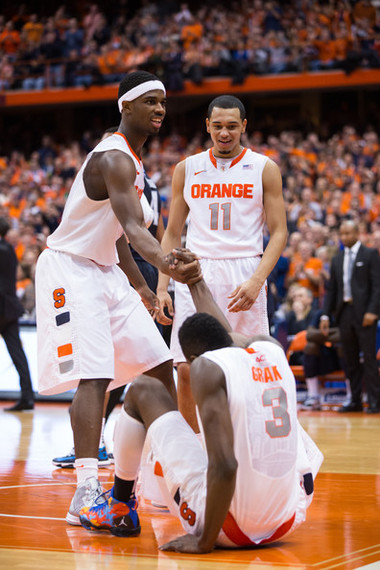Recently, Bill Maher tweeted that "March Madness really is a stirring reminder of what America was founded on -- making tons of money off the labor of unpaid black people."
Although there are some parallels, college athletes do receive scholarships and are not forced against their will. A more accurate comparison would be when a company builds a factory in an economically underdeveloped country, paying its workers pennies but making millions while claiming to be doing them a favor by providing a tremendous opportunity they wouldn't otherwise have.
Let's look at the facts: The NCAA is a $6 billion-a-year industry. Yes, that's billion with a "B." And as Hall-of-Famer Kareem Abdul-Jabbar pointed out on CNN last week, in 2013, CBS and TBS split $1 billion just off March Madness alone.
The average annual pay for coaches in this year's NCAA tournament field is $1.47 million. That's based on 62 of 68 schools in the field for which USA Today was able to obtain compensation figures.
Yet the NCAA continues to oppose paying college athletes, and in polls, most people share that opinion -- but it's hypocritical.
The popularity of the NCAA bowl games and March Madness continues to skyrocket, and so do the astronomical television deals and overall profits that come with that exponential growth. While this raises the eyebrows of some, it simultaneously causes universities to clench their Scrooge McDuck empires even tighter. Players don't share in the spoils, and the more money universities make, the more tightfisted they become.
But now, in the wake of a National Labor Relations Board ruling that Northwestern University's football players are, in fact, employees of the university, student-athletes can form a union, and this could change the entire NCAA dynamic as we know it.
There are those, however, who are still completely against the thought of college players not only unionizing, but also being compensated in any form beyond their scholarships.
Some are naive enough to believe that the reason the NCAA doesn't want to pay college athletes is because they are 100 percent committed to the value placed on educational and intellectual enlightenment. Some are actually convinced that the very fiber of our institutions of higher learning would be compromised and the focus of scholastic achievement would quickly dissipate.
Many do not realize that if you have a career-ending injury, you're no longer of any use to the university and can be sold up the river, or, in modern terms, lose your scholarship. I know this firsthand because it almost happened to my wife (then girlfriend), Nichole Oliver (now Nichole Thomas), who, like me, played basketball for Syracuse University.
After her third knee surgery, the Syracuse specialist told her that if she wanted to be able to walk without a cane and play with her kids in the future, she had to stop playing basketball. She was devastated, because as athletes, we are programmed to run through walls, ignore pain and never quit. But after much convincing from the people who cared about her -- mostly her mother -- Nichole made the right decision.
Then-Head Coach Mariana Freeman, Felisha Legette, and the rest of the Syracuse Women's program began a crusade to take Nichole's scholarship away because after all, if you can no longer play what good are you to them. Nichole actually had to get a lawyer and threaten to sue the school then-Athletic Director Jake Crouthamel and the entire Syracuse University in order to keep her scholarship her senior year.
If their main concern was education, this wouldn't have happened. The bottom line is that it's a business. When you play Division I sports, you're not treated as a "student-athlete" -- as colleges love to profess to the world -- you're an athlete-student, and you're there for one reason and one reason only. You can keep your grades up enough to remain eligible, but then again, that's only so you can be able to play -- and earn more money for the university.
But naysayers will tell you things along the lines of...
"Universities are dedicated to inundating capital into each and every student-athlete's academic development."
"Paying college athletes would devalue the Universities as a whole and discredit the student athletes as scholars."
"Paying college athletes would diminish their overall academic growth and would therefore be doing them a disservice."
"We really feel that it wouldn't be fair to the other students who are boggled down with student loans, work study and financial aid programs so we just wouldn't want to hurt their feelings."
If you believe any of that, I have some magic beans that you'd probably be interested in buying as well.
Pulitzer Prize-winning author Taylor Branch -- Martin Luther King Jr.'s biographer -- looked at the state of affairs in college sports and could come to only one conclusion:
"For all the outrage, the real scandal is that two of the noble principles on which the NCAA justifies its existence -- 'amateurism' and the 'student-athlete' -- are cynical hoaxes; legalistic confections propagated by the universities so they can exploit the skills and fame of young athletes."
Thus, the argument against paying college athletes is quickly exposed as one of the most hypocritical, self-serving positions in modern sports. Whether or not college athletes are actually being exploited shouldn't even be a question. The only question is how we can rectify this problem.
This story was originally published on The Root.com
